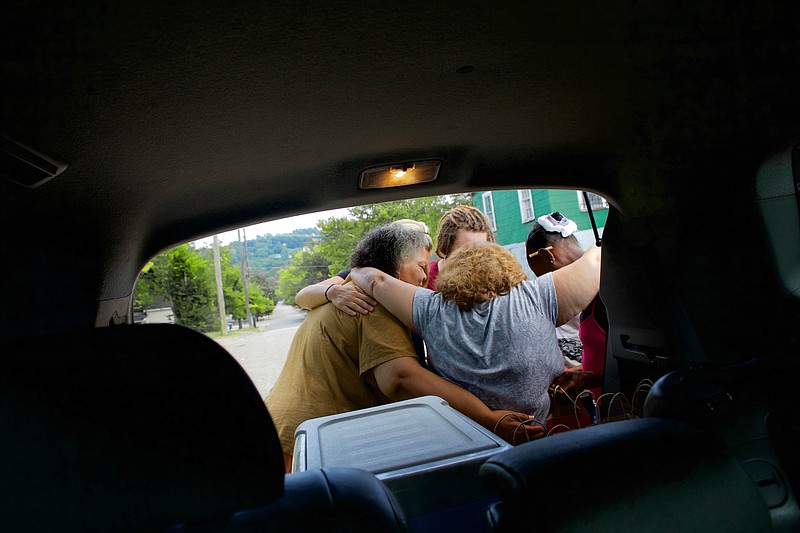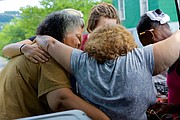More Info
To get involved with Love’s Arm or donate, visit the organizations website at https://www.lovesarmoutreach.org/take-action.
Spotting a woman on the sidewalk, Mimi Nikkel jerks the steering wheel hand-over-hand to the left. She guides her blue Toyota Highlander across a lane of oncoming traffic to stop on the other side of the street, her car parked facing the wrong direction.
The 61-year-old pops open her door, the cooled air in the car's interior rushing out to mix with the muggy, 90-degree weather of the Saturday afternoon. Nikkel barely removes her seat belt and swings her legs out before meeting the woman on the sidewalk with a full embrace, the woman leaning halfway into the vehicle and Nikkel leaning halfway out.
The relationship between the two women is one better counted in decades than years. Their lives have been marked by similar stories and similar stigmas: addiction, prostitution and criminal records.
The embrace lasts several seconds before the two pull apart. As the woman on the sidewalk continues her walk southward, Nikkel pulls her vehicle back onto the street, carrying on the work she has spent more than a decade doing: caring for and helping trafficking victims and prostitutes.
Nikkel is the founding director of Love's Arm, a faith-based nonprofit aimed at stopping prostitution and addiction-related sex work. In the more than 14 years since the group began, Love's Arm has expanded from classes in jails to outreach in strip clubs, staffing a resource hotline and running a recovery home for women. The group's street outreach, which occurs several times a month, is just one way to build relationships with marginalized people in Chattanooga, Nikkel said.
"You never know when someone is going to be ready to get out," she said. "You just have to be available when they are."
Meeting women on the street began from a simple desire to show compassion, Nikkel said. Love's Arm volunteers considered what the women might need. In the back of Nikkel's vehicle, the group stocks water bottles and sports drinks in a cooler, carries bags of hygiene products and condoms, and often has sandwiches to hand out. On the most recent Saturday, there were chicken sandwiches from Burger King. In the winter, they bring warm clothing to give to the women.
When driving around, Nikkel will often roll down her window when she spots someone on the street and ask if they would like a bottle of water or some hygiene products. Yet these introductory interactions between Nikkel and women on the street are less common than the ones in which she rolls down her window and yells a woman's name.
Showing compassion
Nikkel has spent nearly 15 years fighting street prostitution in Chattanooga. Many of the women have received hygiene items from Love's Arm for years. Some have participated in the group's recovery programs but returned to the streets. Nikkel still pulls her vehicle over for them. Relapse is often a part of recovery, she said.
"We don't go out to rescue or save anybody," Nikkel said. "Our main desire is to connect with them where they are and that they have a kind, caring human being connect with them on a basic level of letting them know, 'You're no different than I am and you're worthy of love and dignity and respect.' For many of them, if they want a hug, we give them a hug, and that may be the only safe person that has given them a human touch in years."
Hugs and holding hands are common for the Love's Arm volunteers and women they meet. After handing them a gift bag of hygiene items or a bottle of water, the group often will engage in prayer, allowing the women to pray for themselves and others.
Last Saturday, Karen Roddy led prayers behind the vehicle. She has volunteered with the group for three years and uses her decades of experience as a social worker. Before she goes out for a street outreach, she prays to have God speak through her, she said. Roddy was drawn to Love's Arm because of its mission.
"It's love in action," Roddy said. "You can go to church every day, but this is love in action."
That love is shown in the form of prayers, hugs, holding hands and knowing the women's names, Roddy said.
"It's good to support and let them know that they're in a relationship and have someone backing them up," she said. "The relationship is important so they know there is someone out there that cares for them."
Legal changes
Chattanooga's location along the interstate corridor to Nashville and Atlanta makes it a hub for human trafficking. Since 2010, the Chattanooga Police Department has handled more than 800 reports of human trafficking, according to police data. Trafficking means using force, fraud or coercion to exploit someone for sex or labor. Victims of trafficking may know the people exploiting them and often are victims of childhood abuse.
However, trafficking happens throughout the state, not just in urban areas, said Josh DeVine, Tennessee Bureau of Investigation spokesman.
A 2011 report by TBI and Vanderbilt University found at least one reported case of human trafficking in 78 of Tennessee's 95 counties. Hamilton County was one of eight with more than 100 reported cases in two years. The number of cases reported in the state each year has doubled since 2012, according to data from the National Human Trafficking Hotline.
In response, along with creating a Human Trafficking Task Force, state lawmakers in the past decade have strengthened the felony class for soliciting or promoting prostitution and protected minors from prosecution of prostitution. In 2018, the state was rated among the best in the country for fighting human trafficking, according to Shared Hope International, an advocacy organization. However, Tennessee ranked in the middle of the country in the number of new criminal human trafficking cases it began in 2018, according to analysis by The Human Trafficking Institute.
The increase in trafficking reports should not be taken as a sign that the problem is increasing, said Dash Merritt, Second Life Chattanooga comunity development coordinator. Second Life advocates for policy changes and works with local and state groups to promote trafficking prevention. Chattanooga is making a dedicated effort to stop trafficking, from local nonprofits to public support for organizations such as the Family Justice Center, Merritt said. Together, these organizations are raising awareness in the community.
"People think, 'Oh, trafficking has become a big thing in 2019,'" Merritt said. "But it's not. It's just getting more reported here."
Local nonprofits and advocacy groups are invaluable in stopping trafficking, DeVine said. Law enforcement cannot arrest its way out of the problem.
"What we're seeing with human trafficking in our culture is not that different than the issue of domestic violence 30 or 40 years ago," DeVine said. "Law enforcement was encountering it and people knew about it but there weren't many conversations about it."
The local groups also provide services that the legal system does not, such as mental health professionals trained to be trauma-informed to providing welfare of housing or food. Even groups such as On Point, which focuses on youth development, have their leaders talk to students about trafficking warning signs and how to get help, said Faith Sims, a facilitator with the organization.
DeVine said state and national organizations rely on success of local efforts.
"Every single human trafficking survivor has a different story and every single human trafficking survivor has different needs, so it takes a village," he said.
Finding a purpose
Love's Arm's various ministries have grown as more volunteers joined since the first classes it hosted in 2004. In 2013, a volunteer came with experience as a stripper and launched the outreach program in strip clubs. In 2015, the group began letter writing program with inmates in Silverdale Detention Center.
Last year, Love's Arm opened Rahab's Rest, a free, 24-month recovery home in Chattanooga, to address the fact that addiction and sex work are often linked. The house will be at full capacity with six women in August, Nikkel said. Residents are beginning school and jobs outside the house, she said.
The group has three paid staff, which Nikkel said she wishes she could expand with a larger budget. The rest of the work is powered by volunteers and donors. Love's Arm partners with 22 local churches for donations for programs like the street outreach.
Nikkel's success in connecting with women, whether it is on the street or in the recovery home, comes in part from her lived experience. She was trafficked as a child in Alabama, sexually abused and raped before her 10th birthday and through her teenage years, she said. As Nikkel described it, she began selling herself to feed the alcohol addiction that began at age 10 and the drug addiction that began at age 12.
Those experiences took years of therapy to understand. Going out into the streets decades later as an advocate was difficult at first for Nikkel because she had such strong emotional reactions to the women she met and their situations, she said.
"I know how it feels, like you're an outcast, like you're just a leftover, you're just the wasted part of life," she said.
Now, she believes the trauma was part of her purpose, Nikkel said. What she went through as a child prepared her for her life's mission, she said.
"All of those things that looked horrible, and they are horrible, devastating, abusive, evil things that happened, are now being used for good," she said. "I feel like I've got the greatest job on earth. I just get to, I say, sit on the front porch and watch God show up."
Contact Wyatt Massey at wmassey@timesfreepress.com or 423-757-6249. Find him on Twitter at @News4Mass.

